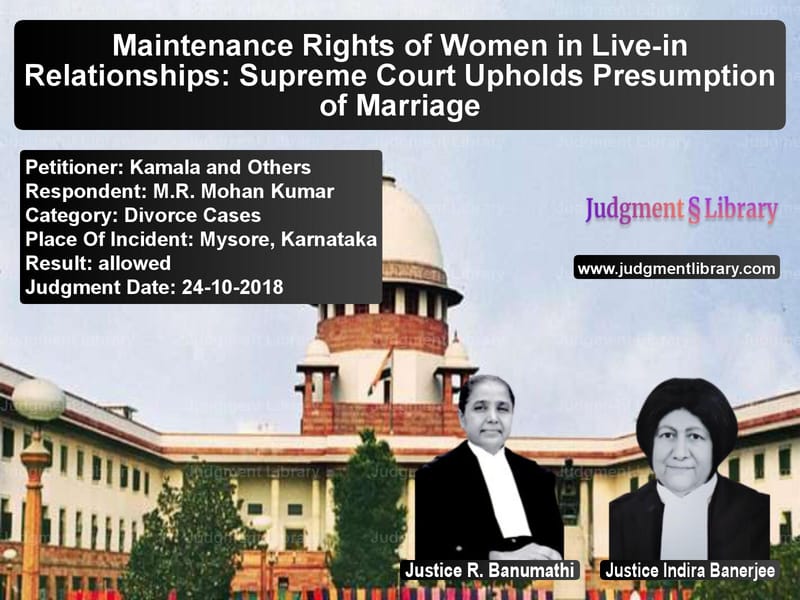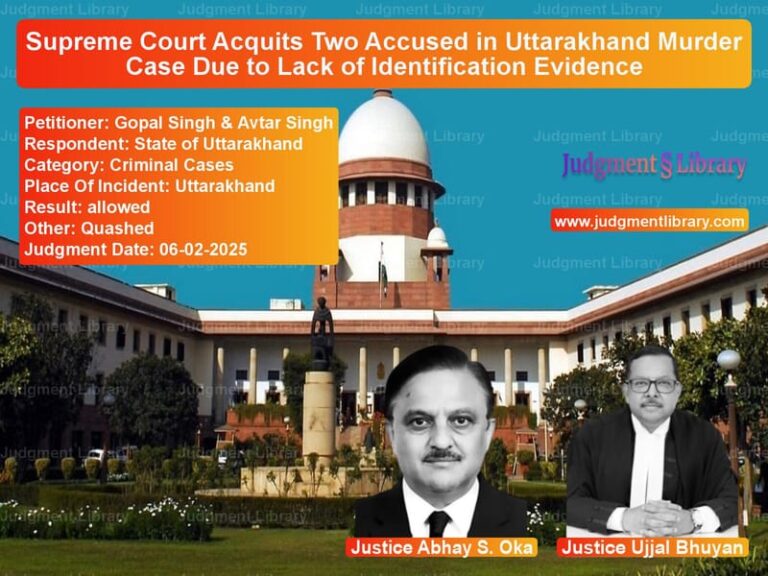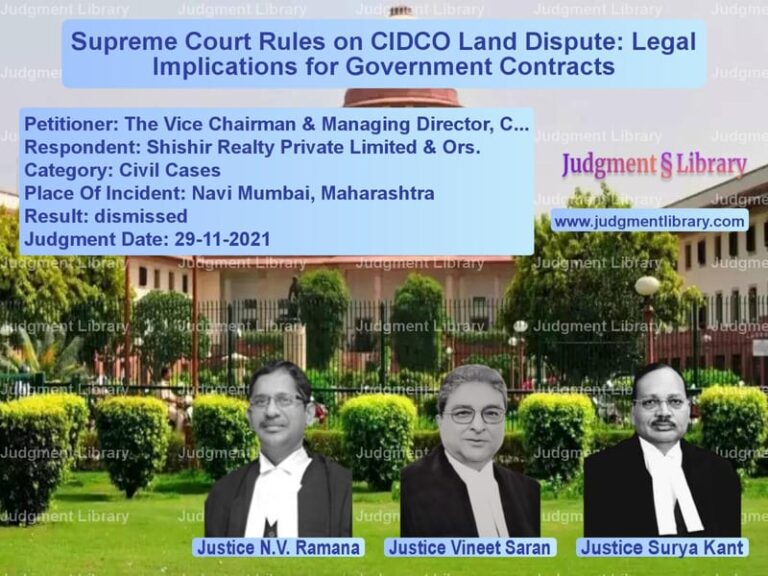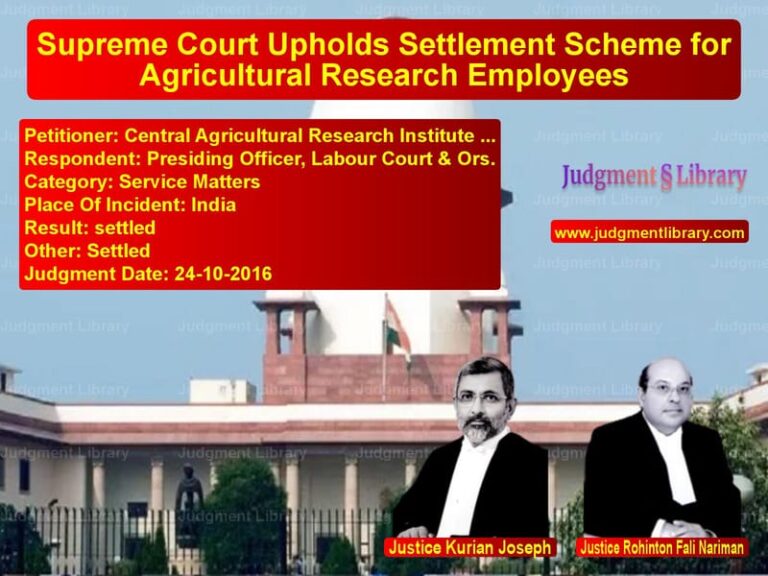Maintenance Rights of Women in Live-in Relationships: Supreme Court Upholds Presumption of Marriage
The Supreme Court of India recently ruled on the rights of women in live-in relationships seeking maintenance under Section 125 of the Code of Criminal Procedure (CrPC). The case revolved around whether a woman, claiming to be the legally wedded wife of the respondent, was entitled to maintenance despite the absence of strict documentary proof of marriage. The ruling reaffirmed the principle that long-term cohabitation gives rise to a presumption of marriage, especially in cases where the woman is financially dependent on the man.
Background of the Case
The appellant, Kamala, claimed that she was married to the respondent, M.R. Mohan Kumar, on July 18, 1998, at the Karrighatta temple near Sri Rangapattana. She further asserted that two children were born out of the wedlock in 2001 and 2003. The couple allegedly lived together in rented accommodations in Mysore, and the respondent provided for the family until he entered into another relationship in 2005. Following this, the appellant alleged neglect and harassment, leading her to file a police complaint. She subsequently filed a petition under Section 125 CrPC, seeking maintenance for herself and her children.
The family court ruled in favor of the appellant, granting her maintenance of Rs. 3,000 per month and Rs. 2,500 per child. However, the Karnataka High Court reversed this decision, holding that the appellant had failed to prove a legally valid marriage and, therefore, was not entitled to maintenance.
Key Issues Raised
- Does long-term cohabitation create a presumption of marriage for maintenance claims?
- Was the High Court justified in overturning the family court’s ruling?
- Should a woman in a live-in relationship be denied maintenance if there is no strict proof of marriage?
Arguments of the Petitioner (Kamala)
- The petitioner argued that she had lived with the respondent as his wife for several years, during which they had two children.
- She presented birth certificates of the children, listing the respondent as their father.
- She submitted photographs of the couple together and receipts of maintenance payments made by the respondent.
- She contended that as per legal precedents, continuous cohabitation should create a presumption of marriage, making her eligible for maintenance.
Arguments of the Respondent (M.R. Mohan Kumar)
- The respondent denied ever marrying the petitioner and argued that their relationship was not legally recognized.
- He claimed that maintenance under Section 125 CrPC is only available to legally wedded wives.
- He dismissed the birth certificates as insufficient proof of a legal marriage.
- He cited previous judgments where women in live-in relationships were denied maintenance.
Supreme Court’s Analysis
The Supreme Court referred to previous rulings, including Dwarika Prasad Satpathy v. Bidyut Prava Dixit and Chanmuniya v. Virendra Kumar Singh Kushwaha, which upheld the presumption of marriage in cases of long-term cohabitation. The Court observed:
- Strict proof of marriage is not necessary in maintenance proceedings under Section 125 CrPC.
- When a couple has lived together as husband and wife for several years and society has recognized their relationship, a presumption of marriage arises.
- The burden of disproving the marriage rests on the man if he denies its existence.
- The respondent’s own actions, including past financial support, suggested an acknowledgment of his relationship with the appellant.
The Court emphasized that the purpose of Section 125 CrPC is to prevent vagrancy and destitution among women. The judges noted:
“When parties live together as husband and wife, there is a presumption that they are legally married. The object of Section 125 CrPC is to provide social justice, and courts must take a broad and expansive view in cases involving maintenance.”
Final Judgment
The Supreme Court ruled as follows:
- The High Court’s decision was set aside, and the family court’s ruling granting maintenance was reinstated.
- The respondent was directed to pay arrears of maintenance within two months.
- The respondent was required to continue paying Rs. 2,500 per month to the appellant and her children.
- The appellant was granted liberty to seek an enhancement of maintenance if needed.
The judgment concluded:
“The law presumes in favor of marriage when a man and woman have cohabited for a long time. It would be unjust to deny maintenance to a woman who has been deserted after years of companionship.”
Implications of the Judgment
This ruling has far-reaching implications for women in live-in relationships seeking maintenance:
- Presumption of Marriage: Long-term cohabitation creates a legal presumption of marriage in maintenance cases.
- Social Justice Perspective: The judgment ensures that women who have lived as wives are not left destitute after separation.
- Burden of Proof on the Man: If a man denies marriage after years of cohabitation, he must provide evidence to disprove it.
- Strengthened Maintenance Rights: The ruling clarifies that strict proof of marriage is not necessary for maintenance under Section 125 CrPC.
This decision reaffirms the judiciary’s commitment to protecting the rights of women who have been in long-term relationships but are denied legal recognition by their partners. It provides a crucial precedent for similar cases in the future.
Petitioner Name: Kamala and Others.Respondent Name: M.R. Mohan Kumar.Judgment By: Justice R. Banumathi, Justice Indira Banerjee.Place Of Incident: Mysore, Karnataka.Judgment Date: 24-10-2018.
Don’t miss out on the full details! Download the complete judgment in PDF format below and gain valuable insights instantly!
Download Judgment: Kamala and Others vs M.R. Mohan Kumar Supreme Court of India Judgment Dated 24-10-2018.pdf
Direct Downlaod Judgment: Direct downlaod this Judgment
See all petitions in Alimony and Maintenance
See all petitions in Domestic Violence
See all petitions in Child Custody
See all petitions in Judgment by R. Banumathi
See all petitions in Judgment by Indira Banerjee
See all petitions in allowed
See all petitions in supreme court of India judgments October 2018
See all petitions in 2018 judgments
See all posts in Divorce Cases Category
See all allowed petitions in Divorce Cases Category
See all Dismissed petitions in Divorce Cases Category
See all partially allowed petitions in Divorce Cases Category







